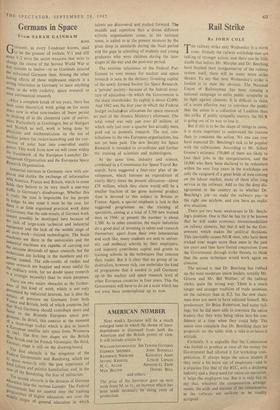Germans in Space
From SARAH GAINHAM
BONN dr-Z,ERMANY, as every Londoner knows, used LI to be the pioneer of rockets. V-1 and still more V-2 were the secret weapons that were to change the course of the Second World War at five minutes to twelve--or so Goebbels assured the exhausted Germans then. Among the other lasting effects of these unpleasant objects is a strong reluctance in Germany to have anything More to do with rocketry, space research or even aeronautical research.
After a complete break of ten years, there has been some theoretical work going on for seven Years now in what non-readers of Snow persist in thinking of as the cloistered calm of univer- sities. Particularly at Goettingen, but at Stuttgart and Munich as well, work is being done by Physicists and mathematicians on the use of nuclear power for rocket-launching and the con- version of solar heat into controlled usable Power. This work from now on will come within the framework of the European -Launcher De- velopment Organisation and the European Space Research Organisation. Industrial interests in Germany view with sus- Pieloa and dislike the exchange of information with America, France and Britain, which in some fields they believe to be very much a one-way traffic to Germany's disadvantage. Whether this is really the case is impossible for lay people t0 -Judge. In one sense it must be the case, for there is so little organised practical work done lh Germany that the side-results of German work cannot possibly be developed here because of tha lack of large-scale technical and industrial equipment and the lack of the middle stage of all such work—trained technologists. The brain machines are there in the universities and the industrial machines are capable of carrying out the intricate demands of space research, but the technicians are lacking in the numbers and ex- pertise needed. The side-results of rocket and Space research are happier and more useful (in the ordinary sense, for no doubt space research 's a strategic necessity) than its main purposes. There are two major obstacles to the further- !nee of this kind of work, which is not only s``.,ein.anded by industrial interests, but is also the riect of pressure on Germany from both tFrance and Britain, both of which countries feel f.,at West Germany should contribute more and ;ter to the Brussels European space pro- gramme. In detail, this consists at the moment three-stage rocket which is due to launch in European satellite into space from Woomera hill 965- The first two stages are the British ce e Streak and the French Veronique; the third, ,_rrtlan, stage is still on the drawing-board. F first obstacle is the stinginess of the ederal Government and Bundestag, which see space research only the past experience of fatal failure and painful humiliation; and, in the ease of the Bundestag, the fear of militarism. The second obstacle is the division of German education ,. e 1°11 into the various Laender. The Federal tnrnent has no control over the training Program, Mindl es of higher education, nor over the e stages of general education in which
talents are discovered and pushed forward. The muddle and repetition that a dozen different schools organisations cause, in the national sense, is added to at the present moment by the great drop in standards during the Nazi period and the gaps in schooling of students and young graduates who were children during the later stages of the war and the post-war period.
The extreme reluctance of the Federal Par- liament to voet money for nuclear and space research is seen in the derisory founding capital of the newly formed Society for Space Research, a 'private' society--because of the federal struc- ture of education—in which the Government is the main shareholder. Its capital is about £2,000. And 1962 was the first year in which the Federal budget included an allocation for space research 'as part of the Atomic Ministry's allotment. The total voted was only just over £3 million, of which only just over a quarter has actually been paid out to domestic research. The rest, con- tributions to the two European organisations, has not yet been paid. The new Society for Space Research is intended to co-ordinate and further the training of scientists and technologists.
At the same time, industry and science, combined in a Commission for Space Travel Re- search, have suggested a four-year plan of de- velopment, which foresees an expenditure of nearly thirty times the present allocation—about £78 million, which they claim would still be a smaller fraction of the gross national product than is devoted to this subject in Britain or France. Again, a special emphasis is laid in this suggested programme on the training of specialists, aiming at a total of 3,700 new trained men in 1966; at present the number is about 1,500. As in other countries, the major industries do a good deal of investing in talent and research themselves; apart from their own laboratories and such like, many students are sent to univer- sity and technical schools by their employers, and industry contributes capital and grants to training schools in the techniques that concern their trades. But it is clear that no group of in- dustrialists, however rich, can undertake the kind of programme that is needed to pull Germany up to the nuclear and space research level of other European countries in four years. This the Government will have to do on a scale which has not even been contemplated up to now.


































 Previous page
Previous page